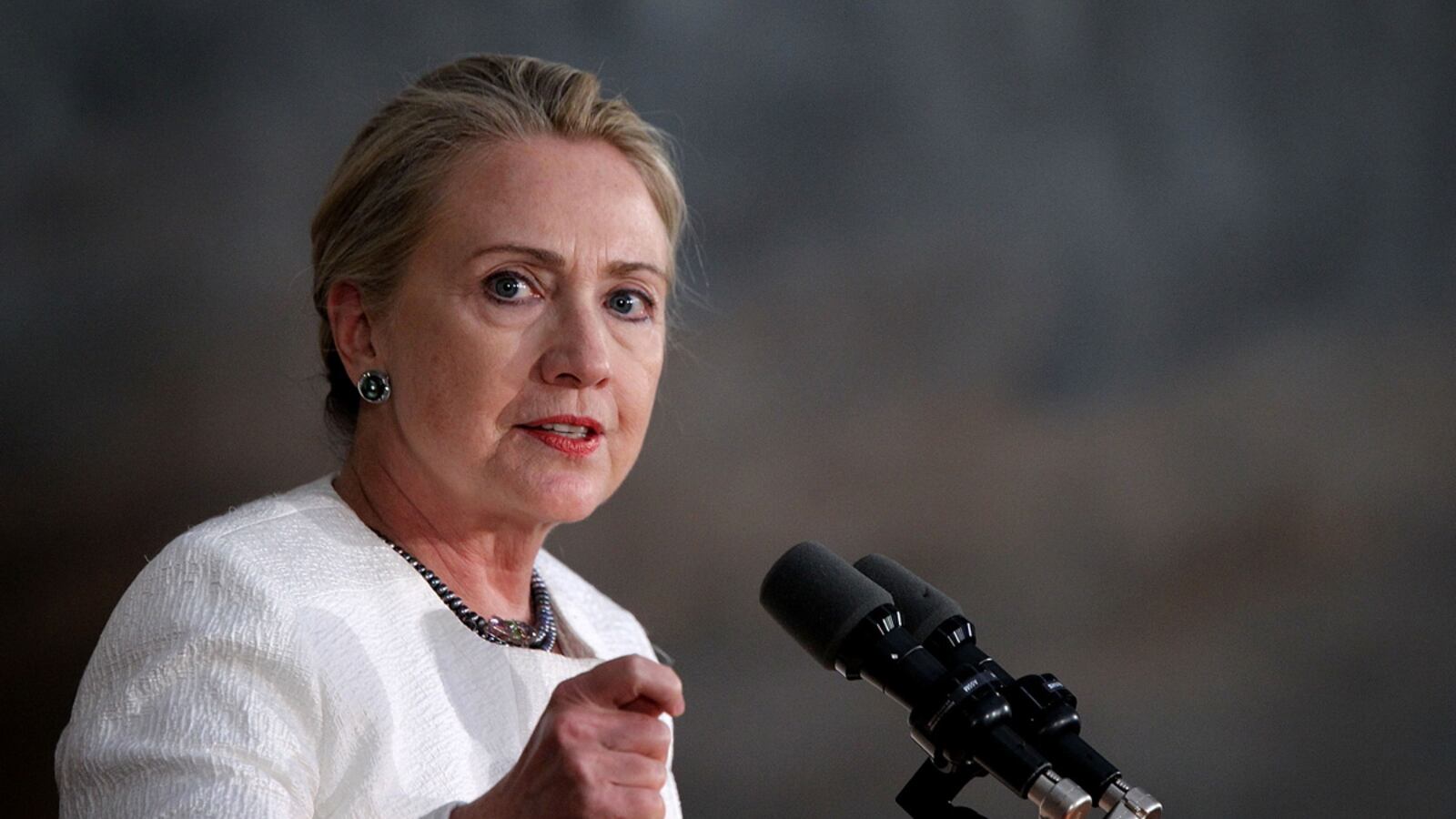With anti-American demonstrations, some violent, continuing throughout the Arab world, U.S. diplomats are on the front lines—sometimes, it seems, without adequate protection. In the middle of a presidential election, voters are left wondering what all the mayhem means and whether a budget-strapped State Department can muster the resources necessary to provide security in these turbulent times.
Following a week of turmoil in which four Americans lost their lives in Libya and non-essential personnel were evacuated from normally peaceable Tunisia after a mob scaled the embassy wall, set fires and vandalized the building, the Obama administration is far from breathing easy.
Officials are bracing for more demonstrations on Friday, the traditional day of communal prayer for Muslims, and they expect the wave of protest to continue for some time. Stunned by the range and velocity of the opposition, those monitoring the situation said the protests sparked by a video mocking Prophet Muhammad stretched from Morocco to Malaysia and even to Sydney, Australia, where angry demonstrators got into the lobby of the high-rise building housing the American consulate.
With Secretary of State Hillary Clinton scheduled to testify on Capitol Hill on Thursday in a closed intelligence briefing, the adequacy of the U.S. response will be front and center, along with the administration’s policy toward the Arab spring and its emerging democracies. Clinton is expected to soon announce an “accountability review board” as required by law to investigate any incident where diplomatic personnel lose their lives. In addition to representation from within the intelligence community, appointees will come from outside the administration and will by reputation be seen as Washington wise men.
A congressional aide says, “We are still learning all the details as to what happened, so we cannot make an informed judgment” that all the security protocols were followed. Clinton is likely to use her appearance to explain how security abroad works, and to tamp down concerns that the administration can’t handle the ongoing disturbances. In Libya, for example, the assailants had heavy weapons, RPGs and mortars, raising the prospect that what happened in Benghazi was more than a protest that got out of hand. “No one comes to protest with rocket launchers,” says Jonah Blank, a former Senate Foreign Relations committee staffer, now with Rand Corporation.

Every nation relies on the host country to do perimeter security like closing streets and providing a checkpoint. When all hell breaks loose, the host government is supposed to send in its police and/or military to provide protection. In Cairo, the Egyptian military watched as protesters scaled the walls.
Second, all embassies have locals hired as guards by the State Department, and they’re usually not armed. They’re the people who examine IDs and check out cars coming in, much like security guards in Washington buildings. The inner perimeter of an embassy, the chancery, where the actual business of the embassy goes on, is where the Marines are stationed. The Marine guardhouse is always referred to as Post One.
In Tunisia, the system worked like it was supposed to. The chancery building was safe from harm even though protesters scaled the outer wall and it took the host country a couple of hours to clear out the looters and vandals.
Why weren’t there Marines in Benghazi? Evidently because it was a temporary structure, and wasn’t even considered a consulate. Ambassador Chris Stevens was visiting from Tripoli, Libya, and there apparently was no sensitive communications center that warranted the presence of Marines. Stevens was protected by a contingent of diplomatic security special agents, the State Department’s counterpart to the Secret Service. They report to the RSO (resident security officer). The two former SEALs who were killed in the Benghazi raid were armed. They were contractors, and the State Department used them for essential security. A generation ago, diplomatic security could do the job largely on its own, but the demands of two wars have forced a greater reliance on outside contractors.
Most embassies have Marines assigned to them, while most consulates do not. Clinton likely will be grilled on whether a greater security presence is needed. In recent days, more military assets have been dispatched to several trouble spots, including Yemen and Tripoli, but when U.S. officials asked the Sudanese government for permission to bring in a Marine platoon, the answer was no. The Sudanese said it would be seen as a provocation and that their government is responsible for protecting diplomatic personnel. That’s how it’s supposed to work, but when the Sudanese announced to the press that they had rejected the Marines, U.S. officials were miffed.
“Is the key question really embassy security, or how we relate to the world?” asks Blank. He notes that Ambassador Stevens knew the country well, was fluent in Arabic, and had worked closely with opposition leaders during the revolution, often putting himself in risky situations for the sake of his mission. “Unless we want our diplomats to remain barricaded in fortress-like offices, there will always be risk,” says Blank.
If the investigation into what happened in Benghazi turns up negligence, then that’s something quite different, and potentially fixable.
But if all the protocols in place were followed, then the larger issue is how U.S. diplomats will do their job amidst the tumult and chaos of the populist uprising sweeping the Arab world.
“It will be a tragedy if we learn the wrong lesson and the result is, we’re back into our shell,” says a congressional staffer.
That isn’t anybody’s longtime goal, but with the potential of continuing unrest having an impact on the presidential race, U.S. embassies will be battened down for at least the next several weeks.





